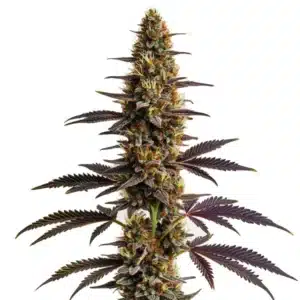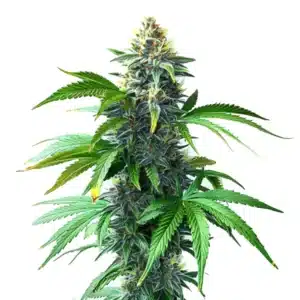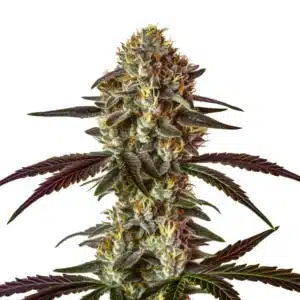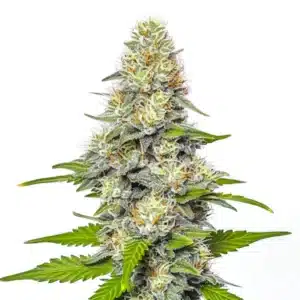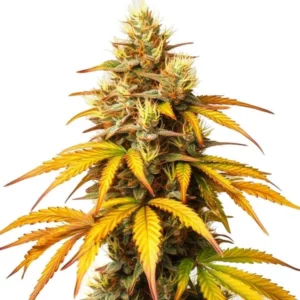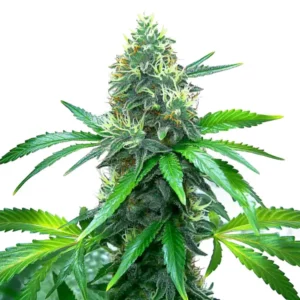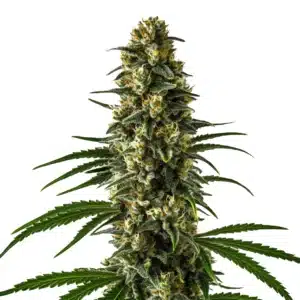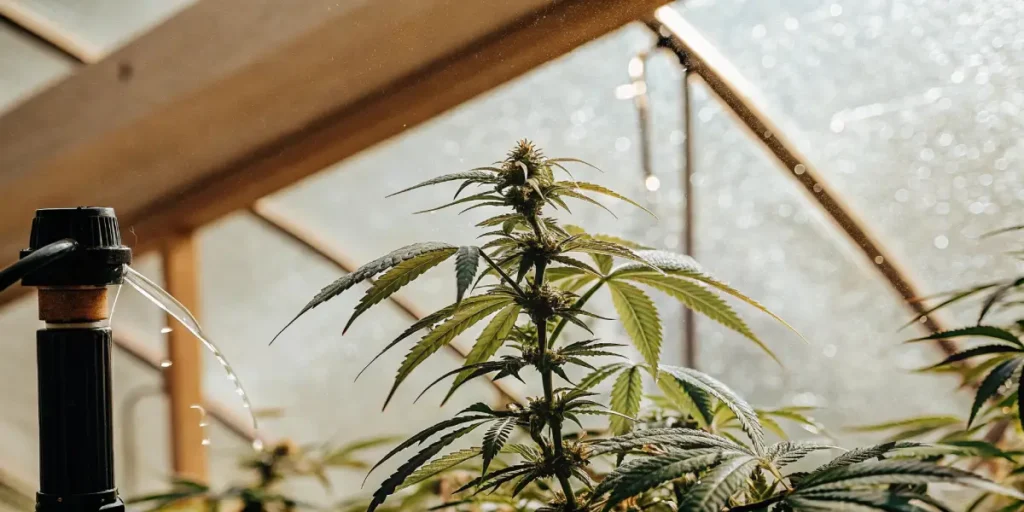
Abscisic Acid Role in Cannabis Stress Response
The abscisic acid role in cannabis stress response is critical for helping plants adapt to challenging conditions. Abscisic acid (ABA) is a plant hormone that acts as a natural defense mechanism. When cannabis plants face tough situations such as drought or heat, ABA kicks in to support their survival and growth. For both first-time buyers and seasoned growers, knowingthe abscisic acid role in cannabis stress response can make a big difference in cultivation success.
When cannabis plants face drought stress, their leaves might droop, and growth can slow down. This is where abscisic acid steps in. It signals the plant to close its stomata, which are tiny openings on the leaf surface. By closing these, the plant reduces water loss, conserving moisture. This is crucial when you’re growing strains like Blue Dream, known for their resilience, but not immunity, to dry spells.
Recommended Strains
Platinum Cookies
|
|
THC | 19% - 24% (Medium) |
|
|
Type | Feminized |
|
|
Yield | Low |
|
|
Phenotype | 60% Indica / 40% Sativa |
Apples and Bananas
|
|
THC | 23% - 30% (High) |
|
|
Type | Feminized |
|
|
Yield | Low |
|
|
Phenotype | 50% Indica / 50% Sativa |
In the realm of salt stress, cannabis plants can struggle when the soil becomes too salty, which can happen if you over-fertilize. Abscisic acid helps manage this by regulating ion uptake, keeping harmful salts at bay. For growers nurturing varieties like Girl Scout Cookies, which is sensitive to nutrient overloads, this natural process ensures healthier plant development.
Abscisic Acid and Cannabis Heat Stress Response
When temperatures soar, cannabis plants can suffer from heat stress. This stress can lead to wilting, leaf burn, and even stunted growth. Abscisic acid plays an essential role in mitigating these effects. It prompts the plant to produce heat shock proteins. These proteins act like a protective shield, reducing damage.
For those cultivating cannabis in hotter climates, such as growing OG Kush, knowing the abscisic acid cannabis heat stress response is vital. By managing environmental factors and supporting the plant’s natural hormone responses, you can maintain healthier crops even under intense heat.
The abscisic acid impact on cannabis stress adaptation is not only crucial for heat stress but also for overall plant health. By enhancing the plant’s defense mechanisms, growers can ensure a more stable growth environment. This, in turn, promotes better yields and higher quality buds, even under suboptimal conditions.
Moreover, abscisic acid helps in maintaining cellular integrity during heat stress. This ensures that the plant’s metabolic processes continue without significant interruptions. As a result, the plant can sustain growth and development, which is essential for achieving productive harvests.
Practical Tips for Enhancing Abscisic Acid Response
There are several techniques you can apply to enhance the abscisic acid impact on cannabis stress adaptation. One effective method is to practice regular soil monitoring. Ensuring balanced moisture levels helps prevent unnecessary stress triggers. Use a moisture meter to check your soil and water only when necessary.
Additionally, provide shade during peak sun hours, especially if you’re growing outdoors. This simple step can prevent heat stress, allowing the natural abscisic acid signaling to work effectively without overwhelming the plant.
Incorporating organic fertilizers can also support the abscisic acid role in cannabis stress response. These fertilizers improve soil texture and nutrient availability, which in turn enhances the plant’s ability to produce abscisic acid naturally. This leads to a more robust defense mechanism against stressors.
Furthermore, implementing companion planting strategies can offer additional benefits. Plants such as lavender and basil can deter pests and provide natural shade, reducing environmental stress. This synergistic approach allows abscisic acid to function optimally, enhancing the overall resilience of cannabis plants.
Promos & Deals
Abscisic Acid Role in Cannabis Stress Response
In the case of drought stress, abscisic acid is pivotal. It helps the plant conserve water by closing stomata, those small openings on leaves where water escapes. This mechanism is crucial for survival in dry conditions. Growers often notice improved resilience in strains like OG Kush when abscisic acid levels are optimized.
Salt stress is another challenge where abscisic acid plays a key role. It helps regulate the plant’s uptake of ions, ensuring that harmful salts don’t build up to toxic levels. This is particularly important for cannabis plants in areas with saline irrigation water or when fertilizers are over-applied.
Knowing the abscisic acid role in cannabis salt stress response is essential for managing nutrient applications effectively. By keeping nutrient levels balanced, growers can minimize salt stress, allowing the abscisic acid signaling to function without hindrance. This results in healthier and more productive plants.
Moreover, abscisic acid plays a vital role in maintaining the plant’s osmotic balance during salt stress. This balance prevents cellular damage and supports overall plant vitality. By knowing and leveraging this hormone’s function, growers can optimize conditions for better plant health and yield.
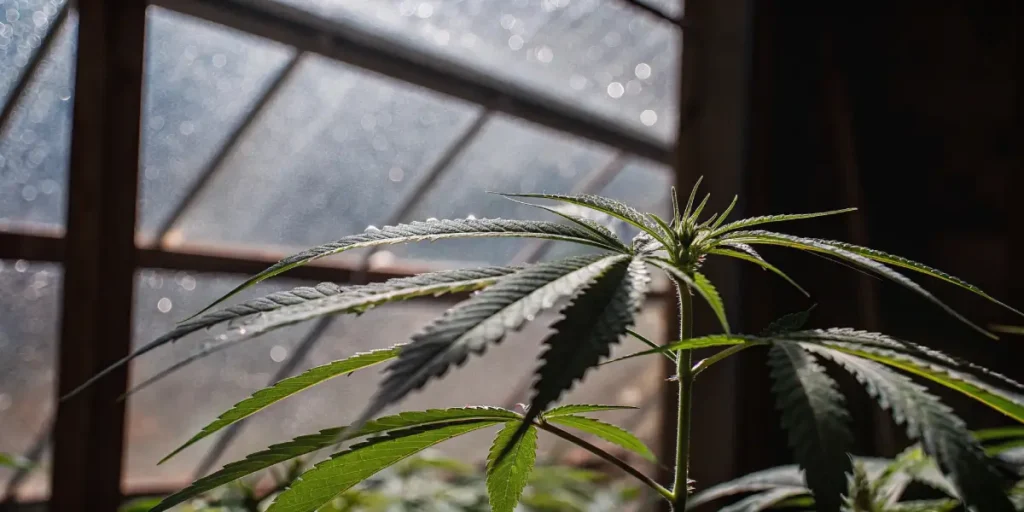
Enhancing Cannabis Stress Response
To enhance cannabis stress response abscisic acid signaling, focus on creating an optimal growing environment. Start by ensuring your soil is well-aerated and rich in organic matter. This promotes healthy root development, enabling better uptake of nutrients and water.
Consider using organic mulches to maintain soil moisture and temperature. This not only helps in drought conditions but also supports the plant’s natural hormone functions, including abscisic acid production.
Another effective strategy is to integrate drip irrigation systems. These systems provide consistent moisture levels, reducing water stress and encouraging more effective abscisic acid response. This precision watering technique ensures that plants receive just the right amount of water, enhancing growth and reducing stress.
Additionally, selecting growth mediums that retain moisture yet allow for adequate drainage can further enhance the abscisic acid role in cannabis stress response. This balance ensures that roots stay healthy and that the plant can efficiently manage stress conditions.
FAQs
What is abscisic acid?
Abscisic acid is a plant hormone that plays a critical role in stress responses. It helps plants manage water loss, regulate ion uptake, and produce protective proteins. In cannabis, abscisic acid is essential for adapting to environmental stresses like drought, heat, and salt.
When you grow cannabis, knowing the function of abscisic acid can help you create better growing conditions. By supporting this hormone’s function, your plants can become more resilient and produce healthier yields.
Abscisic acid also contributes to the plant’s ability to withstand sudden environmental changes. This adaptability is crucial for maintaining plant health and productivity, especially in unpredictable climates. By leveraging this hormone, growers can ensure their crops remain robust under various stress conditions.
Furthermore, the role of abscisic acid extends beyond just stress response. It is also involved in seed dormancy and germination processes, which are critical stages in the cannabis life cycle. Knowing these functions allows growers to optimize plant growth from seed to harvest.
How does abscisic acid help with drought stress?
During drought stress, abscisic acid helps the cannabis plant conserve water. It signals the plant to close its stomata, reducing water loss through evaporation. This conservation is vital for plant survival during dry periods.
For strains like Blue Dream that are grown in drier climates, enhancing the abscisic acid response can lead to better growth and yield. Implementing regular watering schedules and proper soil care can further support this hormone’s function.
Moreover, abscisic acid’s role in regulating water use efficiency is crucial for drought-prone regions. By optimizing water usage, cannabis plants can sustain growth even during prolonged dry spells. This efficiency is especially beneficial for large-scale cultivation where water resources might be limited.
The abscisic acid cannabis drought stress response also involves strengthening root systems. Stronger roots are more capable of accessing deeper water reserves, ensuring that the plant remains hydrated. This adaptability is essential for maintaining plant health during water scarcity.
Can abscisic acid help with heat stress?
Yes, abscisic acid is crucial in managing heat stress. It encourages the production of heat shock proteins, which protect the plant from high-temperature damage. These proteins act like a heat shield, ensuring the plant continues to function optimally.
For growers dealing with high temperatures, especially with heat-sensitive strains like Girl Scout Cookies, monitoring and adjusting environmental conditions can enhance the plant’s natural heat stress response.
In addition to heat shock proteins, abscisic acid helps maintain cellular homeostasis under heat stress. This balance is vital for preventing cell damage and ensuring that metabolic processes continue without disruption. By supporting these functions, growers can achieve better plant resilience during heatwaves.
Furthermore, the abscisic acid cannabis heat stress response includes activating antioxidant systems within the plant. These systems neutralize harmful reactive oxygen species generated during heat stress, protecting plant tissues from oxidative damage. This comprehensive protective mechanism is key to sustaining plant health in hot environments.
Is abscisic acid effective against salt stress?
Abscisic acid plays a significant role in reducing salt stress effects. By regulating ion uptake, it prevents toxic levels of salts from accumulating in the plant. This regulation is crucial for maintaining healthy plant functions.
Salt stress often arises from over-fertilization or saline water. Therefore, managing nutrient applications and monitoring water quality can support the abscisic acid role in cannabis salt stress response.
Abscisic acid also enhances the plant’s ability to exclude sodium ions while retaining essential nutrients like potassium. This selective ion uptake is critical for preventing nutrient imbalances and supporting overall plant health under saline conditions.
Moreover, the hormone helps strengthen cell walls, providing additional protection against salt-induced osmotic stress. By enhancing cell wall integrity, cannabis plants can better withstand saline environments, ensuring continued growth and productivity.
How can I support abscisic acid function in my cannabis plants?
To support abscisic acid function, focus on providing optimal growing conditions. This includes maintaining proper soil moisture, providing shade during extreme heat, and using organic mulches to regulate soil temperature and moisture.
Choosing stress-resistant strains like OG Kush can also enhance your success rate. These strains are bred to naturally support robust abscisic acid functions, leading to healthier, more resilient plants.
Incorporating beneficial microbes into your growing medium can further support abscisic acid function. These microbes enhance nutrient availability and promote root health, which in turn supports hormone production and stress resilience.
Additionally, regular environmental monitoring can help you identify stress factors early. By addressing potential issues before they escalate, you can ensure that abscisic acid and other stress response mechanisms remain effective, resulting in healthier plants and improved yields.Abscisic acid (ABA) is a plant hormone that helps cannabis plants deal with stress. Think of it as a natural defense mechanism. When cannabis plants face tough conditions, such as drought or heat, ABA kicks in to help them adapt and survive. For both first-time buyers and seasoned growers, knowing this little helper can make a big difference in cultivation success.
When cannabis plants face drought stress, their leaves might droop, and growth can slow down. This is where abscisic acid steps in. It signals the plant to close its stomata, which are tiny openings on the leaf surface. By closing these, the plant reduces water loss, conserving moisture. This is crucial when you’re growing strains like Blue Dream, known for their resilience, but not immunity, to dry spells.
In the realm of salt stress, cannabis plants can struggle when the soil becomes too salty, which can happen if you over-fertilize. Abscisic acid helps manage this by regulating ion uptake, keeping harmful salts at bay. For growers nurturing varieties like Girl Scout Cookies, which is sensitive to nutrient overloads, this natural process ensures healthier plant development.


